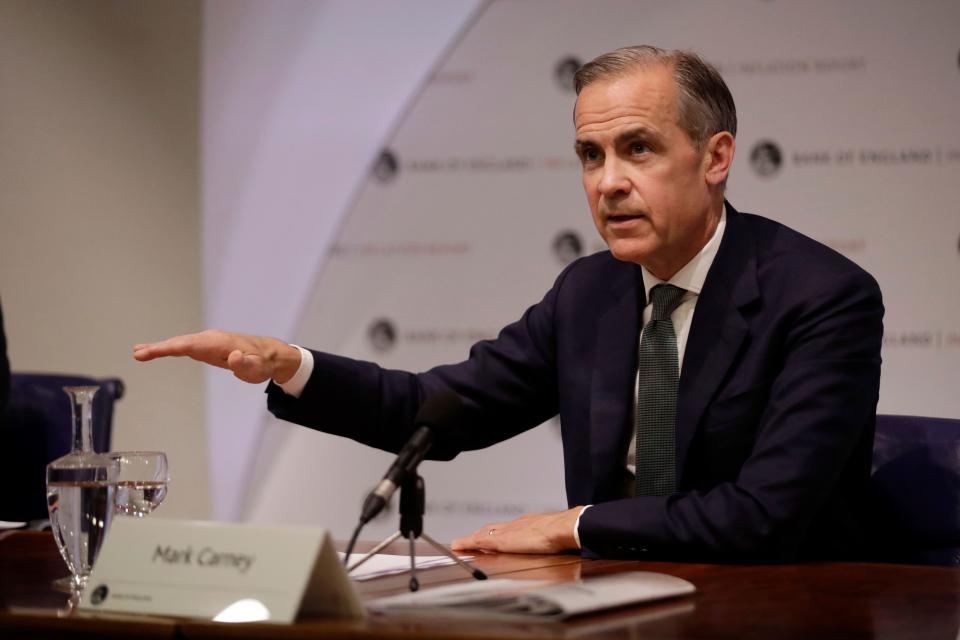Bank of England holds interest rate at 0.75% as 'downside risks' increase

The Bank of England on Thursday held the headline UK interest rate at 0.75%.
The central bank delivered its June interest rate decision at 12pm on Thursday. The 9-person Monetary Policy Committee (MPC) voted unanimously to hold the bank borrowing rate at 0.75%. Analysts and economists had widely forecast this outcome.
The MPC said UK economic growth appears to have “weakened slightly in the first half of the year” and said “downside risks to growth have increased.”
“Globally, trade tensions have intensified,” the MPC said in a statement. “Domestically, the perceived likelihood of a no-deal Brexit has risen. Trade concerns have contributed to volatility in global equity prices and corporate bond spreads, as well as falls in industrial metals prices. Forward interest rates in major economies have fallen materially further.”
Pound falls on decision
The pound fell against the dollar and the euro in the immediate aftermath of the Bank’s decision, although not significantly.
The pound was down about 0.1% against the euro at €1.123 10 minutes after the decision, having traded at €1.125 just before the announcement. Sterling was up 0.4% against the dollar at $1.269 but had been as high as $1.272 earlier in the morning.
The drop-off came as investors judged that Thursday’s update meant a future interest hike from the Bank of England looked less likely.
The Bank of England and governor Mark Carney have consistently said they plan to gradually raise the UK interest rate.
The MPC said on Thursday that if the economy develops “broadly in line” with forecasts and there is a smooth Brexit, then “an ongoing tightening of monetary policy over the forecast period, at a gradual pace and to a limited extent, would be appropriate.”
However, analyst and economists say the failure to resolve Brexit means the bank is unlikely to make any major changes this year.
“Despite a growing number of hawkish signals coming from the Monetary Policy Committee, in reality the Bank’s room for manoeuvre is limited until Brexit uncertainty clears,” Tej Parikh, chief economist at the Institute of Directors, said in a statement.
The MPC admitted on Thursday: “The economic outlook will continue to depend significantly on the nature and timing of EU withdrawal.”
Brexit cloud hangs over the Bank
Despite the Bank’s signals about raising rates, Investors believe the Bank of England is more likely to cut interest rates than raise them, according to market data ahead of Thursday’s announcement.
The backdrop to Thursday’s decision was a mixed economic picture for the UK. Jobs and wage data has held up well so far in 2019, but GDP growth is sluggish and recent manufacturing data suggests it could remain that way.
The MPC said on Thursday that recent data has been “volatile, in large part due to Brexit-related effects on financial markets and businesses.”
However, the committee repeated the statement that its “response to Brexit, whatever form it takes, will not be automatic and could be in either direction.” Carney has in the past said that the Bank could raise interest rates in response to a no-deal Brexit, although economists and investors largely think he is bluffing.
Central banks load the ‘bazookas’
The Bank of England’s decision to hold rates steady came as other major central banks this week signalled intentions to loosen monetary policy.
European Central Bank chief Mario Draghi said earlier this week that more stimulus may be needed in the eurozone if conditions do not improve. The US Federal Reserve held its benchmark interest rate unchanged at 2.5% on Wednesday but signalled a future interest rate cut looks increasingly likely.
READ MORE: Fed remains unchanged on rates, pledges to 'sustain the expansion'
IMF head Christine Lagarde warned in January that “the world economy is growing more slowly than expected and risks are rising.” Conditions have not improved markedly since then, with key issues such as the US-China trade war and Brexit yet to be resolved.
Bank of England governor Mark Carney will give a speech at the annual Mansion House dinner in London on Thursday evening. Carney could give more details on his outlook for the UK economy and future rate movements.

 Yahoo Finance
Yahoo Finance 